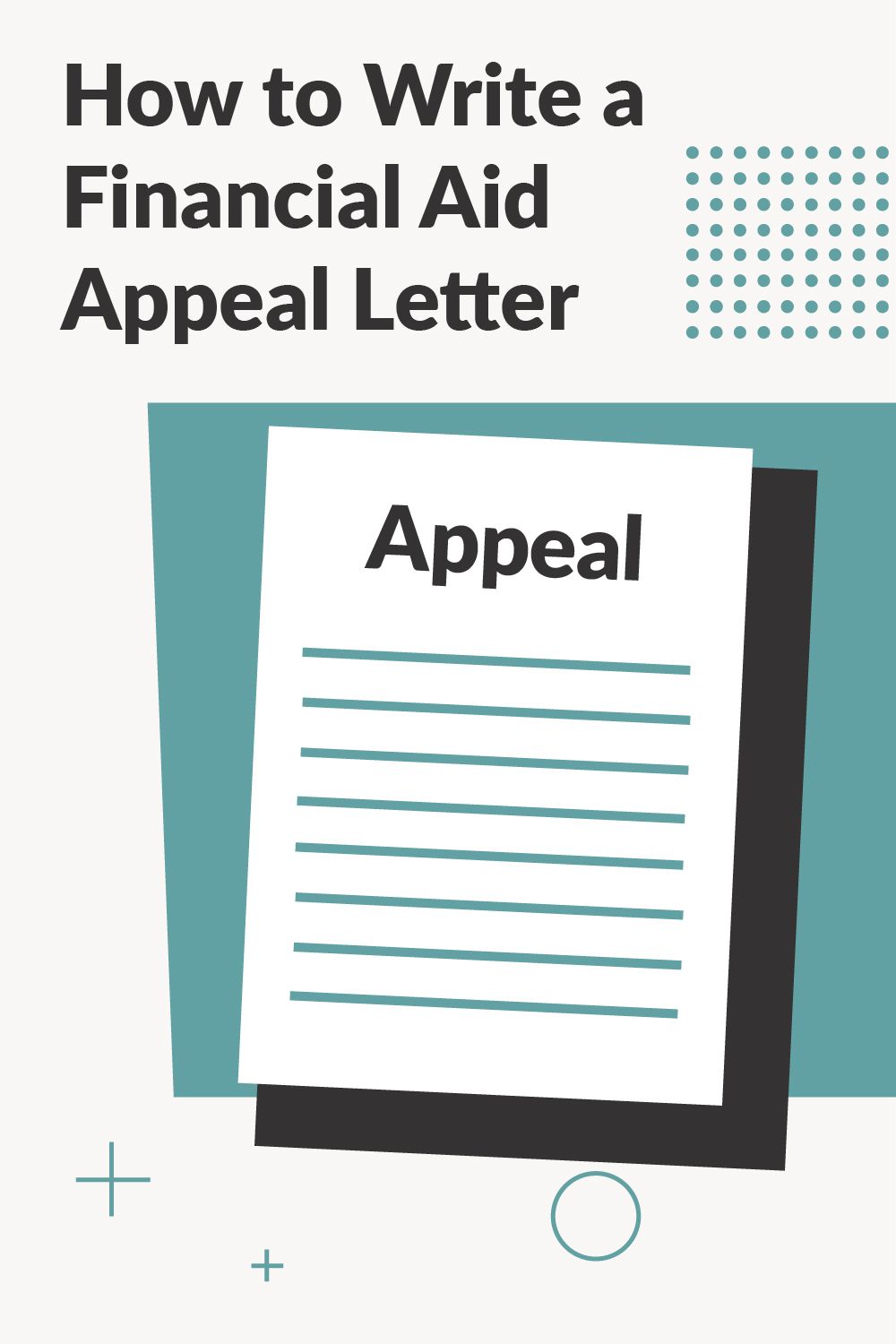
If your financial aid package falls short of your need, you can ask the college for more financial aid by sending them a financial aid appeal letter.
A financial aid appeal is not like a negotiation. It is not like bargaining for a lower price on a car at the car dealership.
Most students lack leverage to get the college to throw out its financial aid rulebook. Good grades and test scores, and strong extracurriculars may get a student into a college, but aren’t enough to earn the student a full scholarship.
To get an increase to your financial aid package, you need to know how to present your financial situation correctly. Merely asking for more money will not work, unless your appeal is supported by documented special circumstances.
A successful financial aid appeal is based on providing the college financial aid administrator with relevant new information about special circumstances that affect your ability to pay for college. In this article, we'll show you how to write a financial aid appeal letter and let you know what supporting documentation to provide.
What Is Considered A Special Circumstance?
A special circumstance is a situation that affects the student’s and family’s ability to pay for college. There are three main types of special and unusual circumstances:
- A change in income from the year upon which financial aid is based. The Free Application for Federal Student Aid (FAFSA) is based on two-year-old income and tax information. For example, the 2024-25 FAFSA is based on income and taxes from 2022. Changes in income can be caused by job loss, pay cuts, retirement and the death or disability of a wage-earner. It can also be caused by divorce or separation and the end of child support or Social Security benefits when a child reaches the age of majority.
- Extenuating circumstances that are different from the typical family. This can include high unreimbursed medical or dental expenses, high dependent care costs for a special needs child or elderly parent and private elementary and secondary school tuition for a younger sibling. It can also include financial disasters, such as those caused by a natural disaster or other factors beyond the family’s control.
- Dissolution of the family relationship between the student and their parents. A dependency override to reclassify a dependent student as an independent student can be justified by the long-term incarceration or hospitalization of both parents, court protection from abuse orders against the parents, abandonment or the parents’ whereabouts are unknown.
Special circumstances can also include adjustments relating to the need to exclude unusual one-time increases in income, such as volatile income such as self-employment income, unusual bonuses, unusual capital gains, Roth IRA conversion, lottery winnings, hardship distributions from retirement plans, inheritances and insurance settlements. Generally, the increase in income should be temporary and a one-time event that is not reflective of ability to pay during the academic year.
On the other hand, high debt payments, such as from a credit card or mortgage, are generally not considered to be special circumstances. Unwillingness to borrow is usually not a good basis for a financial aid appeal. Special circumstances do not include tithing, charitable contributions and family vacations. Most college financial aid administrators will not make an adjustment because of discretionary choices by the family, though most will make an adjustment to income when a student quits a job to go to school full-time.
Do Your Research First
You need to research and understand how your financial aid award compares to similar students in your situation. A great tool for this is TuitionFit. You can upload your financial aid award, and you'll see how it compares to others that received award letters from your school. This will help you understand if the award you received is high, medium, or low. Check out TuitionFit here >>
You can also use the U.S. Department of Education’s College Navigator tool to review key financial aid data for the college:
- Average institutional grants or scholarships for freshmen in the Financial Aid tab. If the grants and scholarships in your financial aid package already exceed the average, there may be less room for an adjustment.
- Average net price for your income range. Subtract this from the total expenses in the Tuition, Fees and Estimated Student Expenses tab to compare with the grants and scholarships in your financial aid offer from the college. (Be sure to distinguish grants and scholarships from student loans and student employment.)
Use the college’s net price calculator to play what-if games, such as the impact of a change in income, assets or demographic variables.
Contact the college’s financial aid office to ask about their financial aid appeals process. Some colleges have standardized forms for financial aid appeals. Others may ask you and/or your family write a letter to the financial aid office.
Gather Documentation
Gather independent, third-party documentation to support the financial aid appeal. The documentation must be relevant to the special circumstances. Some documentation will provide information about the financial impact of the special circumstances.
Examples include job layoff notices, proof of the recent application for or receipt of unemployment benefits, and medical bills.
Include copies of the documentation, not originals, with the appeal letter. The documentation will not be returned to you after consideration of the appeal is complete.
Write the Appeal Letter
Keep the financial aid appeal letter short and to the point. The financial aid office doesn’t want to read your entire life story. The appeal letter should be no more than two pages long, and, ideally, just a single page.
Start with a single sentence that says why the FAFSA does not adequately address the family’s financial circumstances. This sentence can say that the family’s financial circumstances have changed or that the family has an unusual financial situation.
Follow this with a bulleted list of the special circumstances that affect the family’s ability to pay for college. Use one bullet point per special circumstance. Each bullet point should contain a single sentence description of how the special circumstance has affected the family’s financial situation. Be specific as to dollar amounts and dates.
For example, if a parent was laid off, state the date the layoff became effective, the old income, the new income and the difference. If the parent received severance pay, state the amount and duration. It can be helpful to include a table that shows all sources of income each year.
It doesn’t hurt to share better financial aid award letters from other colleges, so long as you are polite about it. But, very few colleges will match aid offers from other colleges, especially if they don’t compete with the college for students or the other college is wealthier.
Send a separate letter to each college to which the student is applying.
Send the appeal letter with delivery confirmation or tracking. Follow-up a week later to ask if they received the letter and whether they need any more information.
Although the CSS Profile form, which is used by less than 200 colleges for awarding their own financial aid funds, has a built-in question about special circumstances, it may be a good idea to send a separate appeal letter in addition to answering this question.
When to Appeal for More Financial Aid
Send a financial aid appeal letter as soon as you know about the special circumstances. For example, if you or your parent loses a job in the middle of the school year, you can appeal for more financial aid then.
It is best to file the appeal as soon as possible. Many colleges have contingency funds to handle mid-year appeals, but these funds may get depleted as time passes during the academic year.
Only file an appeal when the special circumstances have occurred or will definitely occur. Anything else will be considered to be speculative and the college financial aid office will tell you to wait until the special circumstance has happened.
For example, if you expect a decrease in income because you are planning to retire, most colleges will not consider the appeal until you have actually retired or changed your employment status.
On the other hand, if you expect child support to end because the child will reach the age of majority in the middle of the academic year, that should be mentioned in the appeal letter.
How to Appeal for More Merit Aid
The purpose of merit aid is to recruit academically talented students. Academic scholarships are usually handled by the admissions office, not the financial aid office. These scholarships are awarded automatically based on the information on the college admissions application, such as the student’s GPA and test scores.
If you didn’t satisfy the criteria for a merit scholarship when you applied for admission, but your grades and test scores have improved, ask if you can qualify for some merit aid. At some colleges, a change in academic performance before the student enrolls can lead to merit aid, if you ask for it.
What Happens Next
After the college financial aid administrator receives the financial aid appeal letter, they will ask for more information, if needed.
Then the financial aid administrator (or, sometimes a committee) will review the letter to determine whether the special circumstances justify an adjustment. This part of the process may be subjective.
If the financial aid office decides that the special circumstances justify an adjustment, the adjustment will be based on the financial impact of the special circumstances. This part of the process is formulaic. For example, a change in income may result in a change in income and tax liability on the FAFSA.
In some circumstances the adjustment will be made to the college’s cost of attendance, such as to accommodate special needs expenses, above-average textbook costs or dependent care costs. In most cases an adjustment will be made to the data elements on the FAFSA.
This may lead to a new Student Aid Index (SAI), which may lead to a new determination of financial need, which may lead to a new financial aid package.
What If the New Aid Offer Is Still Too Low
The financial aid formulas lead to a harsh assessment of ability to pay.
But, sometimes the new financial aid package doesn’t even come close to addressing the change in circumstances. If the new financial aid package is completely unrealistic, tell the financial aid office that it is not enough.
During the pandemic, colleges offered families a token adjustment to see if the family would accept it. When the family rejected it, the colleges revealed the real adjustment.
For example, one family had a $25,000 decrease in income, but the college offered only $500 in more financial aid. When the family pointed out that this just wasn’t enough, the college responded with $7,000 in additional financial aid. That’s still harsh. Colleges do not provide a dollar-for-dollar increase in aid, but rather only about $3,000 per $10,000 drop in income. You can sanity-check the financial aid offer using the college’s net price calculator.
Common Mistakes
The number one mistake most students and families make is to not appeal for more financial aid. Some families do not appeal, even though they might have qualified for more financial aid. If there’s anything unusual about your family’s financial situation or cash flow, or anything that has changed in the last two years, file an appeal.
Some people believe that all they need to do is say how wonderful the student is, and ask the college for more money. This will not work, unless the student is truly exceptional, such as a student who won the Olympics or a Nobel Prize. Perfect admissions test scores, high grades or high class rank are not enough.
Don’t ask for a specific amount of money. Financial aid adjustments are formulaic, based on the financial impact of the special circumstances. If you ask for a specific amount of money and it is less than the calculated adjustment to financial aid, you will get less money than you deserve.
Telling the college that they are the student’s first choice won’t make a difference, especially if you say that to all the colleges.
More Resources
SwiftStudent is a tool that helps you write a financial aid appeal letter. The letters are pretty good, but there’s just one problem. It assumes that there is only one special circumstance.
But, when it rains, it pours. Often families are affected by multiple special circumstances. For example, if a parent loses their job, they may also lose health insurance or have to pay COBRA premiums. Or, worse, they will lose their job because they got cancer or another serious medical situation.
To address this limitation, use the SwiftStudent tool multiple times, once for each special circumstance. Then, combine the results.
This article is based in part on the bestselling book, How to Appeal for More College Financial Aid. Check out the free downloadable tip sheet on how to appeal for more financial aid on the book’s website.

Mark Kantrowitz is an expert on student financial aid, scholarships, 529 plans, and student loans. He has been quoted in more than 10,000 newspaper and magazine articles about college admissions and financial aid. Mark has written for the New York Times, Wall Street Journal, Washington Post, Reuters, USA Today, MarketWatch, Money Magazine, Forbes, Newsweek, and Time. You can find his work on Student Aid Policy here.
Mark is the author of five bestselling books about scholarships and financial aid and holds seven patents. Mark serves on the editorial board of the Journal of Student Financial Aid, the editorial advisory board of Bottom Line/Personal, and is a member of the board of trustees of the Center for Excellence in Education. He previously served as a member of the board of directors of the National Scholarship Providers Association. Mark has two Bachelor’s degrees in mathematics and philosophy from the Massachusetts Institute of Technology (MIT) and a Master’s degree in computer science from Carnegie Mellon University (CMU).
Editor: Colin Graves Reviewed by: Robert Farrington
